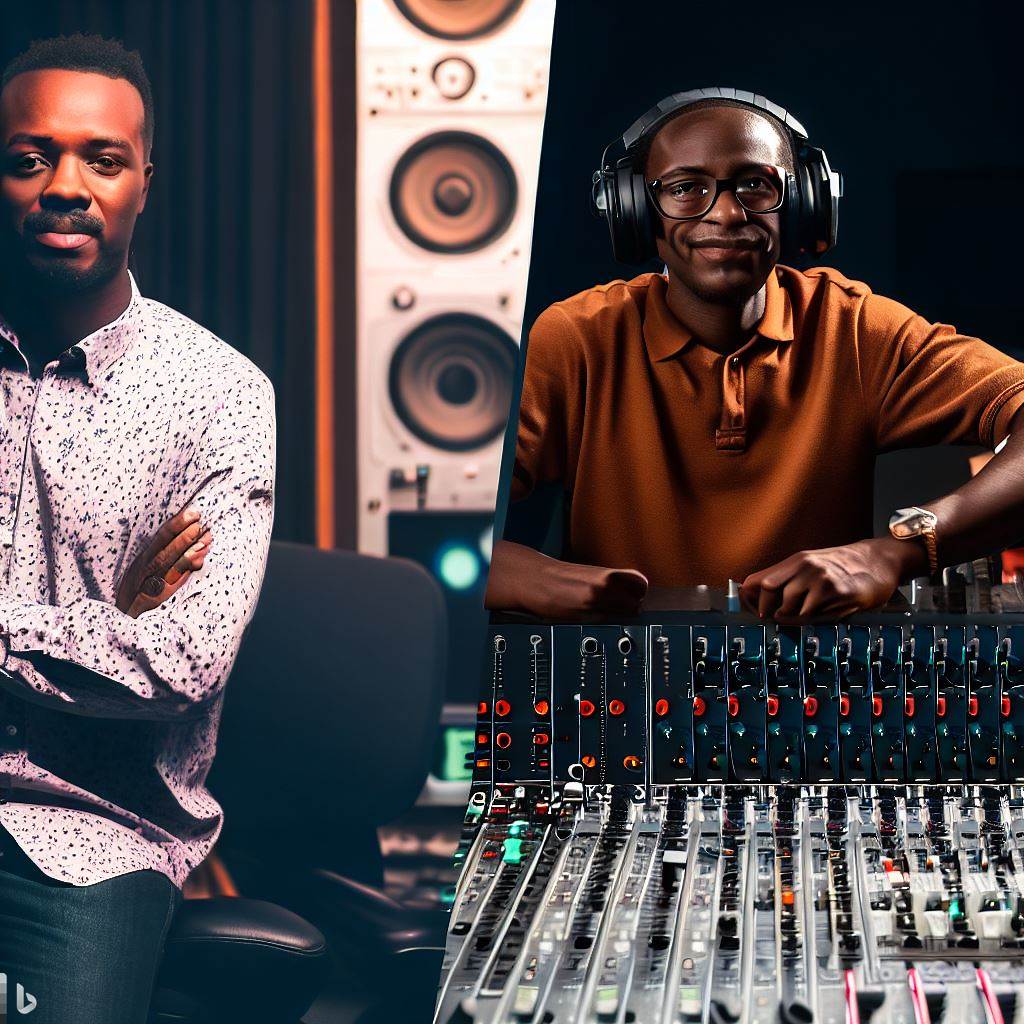Introduction
Mixing engineers play a crucial role in the music industry by balancing, editing, and enhancing audio recordings.
Their expertise in sound manipulation and production is essential to create high-quality tracks.
In Nigeria, the demand for mixing engineers is growing rapidly due to the flourishing music scene and the need for professional sound.
This blog post aims to provide aspiring mixing engineers in Nigeria with educational pathways to pursue their dreams.
Whether you are a budding music enthusiast or a seasoned musician looking to expand your skill set, this post will guide you through the necessary steps to become a successful mixing engineer.
By exploring various educational routes, including formal education and practical experience, we will showcase the available options for aspiring mixing engineers in Nigeria.
Additionally, we will discuss the importance of staying updated with the latest technology and industry trends.
Throughout this blog post, we will highlight the significance of choosing the right educational pathway and acquiring hands-on experience to thrive in the competitive music industry.
Whether you are interested in working in a recording studio or becoming a freelance mixing engineer, this guide will provide you with valuable insights and resources.
Stay tuned and explore the world of educational pathways to becoming a mixing engineer in Nigeria.
Let’s embark on this exciting journey together and pave our way to success in the realm of music production.
High School Education
A. A solid foundation in music and science subjects during high school is crucial
- It provides the necessary knowledge and understanding of music theory and scientific principles.
- This foundation will be beneficial when studying audio engineering and sound mixing.
- Subjects like physics and chemistry help in understanding the technical aspects of sound wave propagation and acoustics.
B. Joining music clubs, choirs, or bands during high school is highly relevant for aspiring mixing engineers
- These extracurricular activities offer opportunities to develop musical skills and gain practical experience.
- Working together in a musical ensemble enhances teamwork and communication skills.
- It also allows for exposure to different genres and styles of music, broadening musical knowledge.
C. Gaining knowledge about recording equipment and software is of great importance
- High school is an ideal time to start learning about basic recording techniques and equipment.
- Understanding digital audio workstations (DAWs) and industry-standard software is crucial for a mixing engineer.
- Expanding knowledge of different recording techniques and equipment will be valuable in future studies and career.
Read: How to Become a Successful Costume Designer in Nigeria
Vocational Schools and Training Programs
A. Vocational schools that offer audio engineering or music production courses in Nigeria
- Adeleke University: Offers a diploma program in Sound Engineering and Music Technology.
- Pan Atlantic University: Provides a Certificate Program in Audio Engineering.
- Alvan Ikoku Federal College of Education: Offers a National Diploma in Music Technology.
B. Benefits of enrolling in these vocational schools
- Hands-on experience: Students gain practical skills through the use of industry-standard equipment and software.
- Industry connections: Vocational schools often have connections with professionals in the audio engineering and music production industry, providing networking opportunities.
- Practical exposure: Students receive real-world experience through internships or work placements during their training.
C. Notable vocational schools and training programs available in different regions of Nigeria
1. Lagos
- Lagos State Polytechnic: Offers a National Diploma program in Music Technology.
- Lighthouse Polytechnic: Provides a diploma program in Audio Engineering and Music Technology.
2. Abuja
- Federal University of Technology: Offers a Bachelor’s degree in Sound Engineering and Music Production.
- Pefti Film Institute: Provides a diploma program in Sound Engineering and Music Production.
3. Port Harcourt
- Rhythm Multimedia Academy: Offers a Certificate program in Sound Engineering.
- International Academy of Music Production and Sound Engineering: Provides a diploma program in Music Production and Sound Engineering.
By enrolling in these vocational schools and training programs, aspiring mixing engineers in Nigeria can gain the necessary skills and knowledge to excel in the field of audio engineering.
Whether it’s through hands-on experience, industry connections, or practical exposure, these institutions offer a valuable educational pathway towards becoming a successful mixing engineer.
With programs available in different regions of Nigeria, individuals can find a school that suits their needs and provides the necessary training to kickstart their career.
Read: How to Become a Successful Artists’ Manager in Nigeria
Tertiary Education Options
A. Relevant bachelor’s degree programs
- Bachelor of Music Production
- Bachelor of Audio Engineering
- Bachelor of Sound Engineering
B. Reputable universities or colleges in Nigeria that offer these degree programs
- University of Lagos
- University of Nigeria, Nsukka
- Obafemi Awolowo University
C. Advantages of pursuing a degree
- Acquiring a degree provides a solid foundation in music production, audio engineering, or sound engineering.
- Theoretical knowledge gained through a degree program enhances the understanding of technical concepts.
- A degree opens doors to various career opportunities in the music and entertainment industry.
- Graduates with a degree have higher chances of securing well-paying jobs in reputable organizations.
- Pursuing a degree allows students to network with industry professionals, increasing their chances of success.
- A Bachelor’s degree provides credentials that are recognized globally, increasing job prospects nationally and internationally.
Read: Journalism Education in Nigeria: What to Expect
Industry Certifications and Workshops
A. Importance of Industry Certifications in the Music Production Field
- Industry certifications validate the skills and knowledge of mixing engineers in Nigeria.
- These certifications enhance credibility and increase job opportunities in the competitive music industry.
- Employers often prioritize candidates with recognized certifications, increasing the chances of career growth.
- Professional certifications provide a comprehensive understanding of industry standards and best practices.
- They also demonstrate commitment to professional development and continuous improvement.
B. Well-Known Certifications for Aspiring Mixing Engineers in Nigeria
- Avid Certified Operator for Pro Tools: Focuses on the use of Pro Tools software for mixing and mastering.
- Music Engineering and Production Certification (MEPC): Offers a broad range of music production skills, including mixing techniques.
- Apple Certified Pro – Logic Pro X: Provides training on using Logic Pro X software for mixing and production.
- Steinberg Certification: Focuses on mastering mixing techniques using Steinberg software, such as Cubase.
- Audio Engineering Society (AES) Certification: Offers comprehensive knowledge in audio engineering, including mixing and recording.
C. Workshops and Seminars Conducted by Industry Professionals
- The Mixing Masterclass: Organized by a renowned Nigerian mixing engineer, it provides hands-on training on advanced mixing techniques.
- Music Production Seminar: Conducted by industry professionals, covering various aspects of music production, including mixing and mastering.
- Sound Engineering Workshop: Focuses on essential skills required for mixing, recording, and live sound engineering.
- Pro Tools Masterclass: A workshop dedicated to mastering Pro Tools software, including advanced mixing techniques.
- Music Production Conference: Brings together industry experts to share insights and knowledge on various aspects of music production, including mixing.
Attending these workshops and seminars can greatly enhance the skills and knowledge of aspiring mixing engineers.
The hands-on training, guidance from experienced professionals, and exposure to new techniques contribute to professional growth.
Additionally, networking with industry experts and like-minded individuals can open doors to future collaborations and opportunities.
Continuous learning and staying updated with new trends and technologies are crucial in the ever-evolving music production industry.
By investing time and effort in obtaining industry certifications and attending relevant workshops, aspiring mixing engineers in Nigeria can advance their careers and excel in their field.
Read: Understanding Nigeria’s Press Freedom Challenges

Gaining Practical Experience
A. Significance of Internships or Apprenticeships in the Music Industry
- Internships and apprenticeships provide hands-on experience and industry exposure.
- They offer a chance to work with established mixing engineers and learn from their expertise.
- These opportunities help aspiring mixing engineers understand the practical aspects of the job.
- Internships and apprenticeships allow individuals to build their professional network within the music industry.
- They provide an opportunity to showcase skills and work ethic to potential employers.
Gaining practical experience is crucial for aspiring mixing engineers in Nigeria.
Internships and apprenticeships play a significant role in this journey as they provide hands-on experience and industry exposure.
Working closely with established mixing engineers allows individuals to learn from their expertise and understand the practical aspects of the job.
B. Ways of Gaining Practical Experience through Assisting Mixing Engineers or Working in Recording Studios
- Volunteering to assist mixing engineers in live performances or studio sessions.
- Participating in workshops or seminars conducted by experienced mixing engineers.
- Seeking part-time or full-time employment at recording studios to gain hands-on experience.
- Offering to mix songs for local artists or bands to enhance practical skills.
- Collaborating with other musicians and producers to work on mixing projects.
Assisting mixing engineers or working in recording studios is another effective way to gain practical experience.
Volunteering at live performances or studio sessions, participating in workshops, and seeking part-time or full-time employment at recording studios can provide invaluable hands-on learning opportunities.
Additionally, collaborating with local artists or bands on mixing projects helps to develop and showcase skills.
C. Platforms for Finding Mentorship Opportunities or Entry-Level Jobs in the Field
- Joining online communities and forums dedicated to mixing engineering.
- Connecting with industry professionals on social media platforms like LinkedIn.
- Attending music conferences, trade shows, and networking events to meet industry insiders.
- Exploring job portals and websites specific to the music industry for entry-level positions.
- Approaching local recording studios or production companies for mentorship or internship opportunities.
Finding mentorship opportunities or entry-level jobs in the field can be facilitated through various platforms.
Joining online communities and forums dedicated to mixing engineering allows individuals to connect with experienced professionals who can provide guidance and mentorship.
Leveraging social media platforms like LinkedIn to build connections is also beneficial.
It is important to attend music conferences, trade shows, and networking events to expand professional networks and meet industry insiders.
Exploring job portals and websites specific to the music industry can help in finding entry-level positions.
Moreover, approaching local recording studios or production companies directly can lead to mentorship or internship opportunities.
Gaining practical experience is a dynamic process that requires dedication, persistence, and continuous learning.
By actively seeking internships or apprenticeships, assisting mixing engineers or working in recording studios, and utilizing platforms for finding mentorship opportunities, aspiring mixing engineers in Nigeria can enhance their skills and pave their way towards a successful career in music engineering.
Explore Further: Effective PR Strategies in the Nigerian Market
Building a Professional Network
A. Importance of Networking for Career Growth and Opportunities
- Networking is crucial for career growth as it creates opportunities and expands professional connections.
- Through networking, you can gain valuable industry insights, knowledge, and new perspectives.
- Building a strong professional network allows you to access job opportunities and collaborations.
B. Ways of Networking in the Nigerian Music Industry
- Attend industry events: Participate in music conferences, workshops, and seminars to meet industry professionals.
- Join professional associations: Become a member of associations like Audio Engineering Society of Nigeria (AESN) or Music Producers and Sound Engineers Association of Nigeria (MUPSEAN).
- Engage on social media platforms: Connect with fellow mixing engineers, artists, and producers on platforms like Twitter, Instagram, and LinkedIn.
- Collaborate with other musicians: Working with other artists builds relationships and expands your network.
- Volunteer for local festivals or music events: Offering your services for free can help you meet influential people in the industry.
C. Benefits of Building Connections with Established Mixing Engineers and Industry Professionals
- Mentorship opportunities: Established mixing engineers can mentor you, provide guidance, and share their experiences.
- Learning from the best: Observing and collaborating with experienced professionals helps you acquire new skills and techniques.
- Increased visibility: Associating with established professionals can enhance your reputation and credibility.
- Access to better projects: Industry connections can lead to more high-profile projects and collaborations.
- Referrals and recommendations: Established professionals may recommend you for job opportunities or refer you to potential clients.
- Industry insights and trends: Building connections allows you to stay updated on the latest industry trends and developments.
In essence, networking plays a vital role in the educational pathway to becoming a successful mixing engineer in Nigeria.
By actively participating in industry events, joining professional associations, and building connections with established professionals, you can enhance your career growth and increase your opportunities within the Nigerian music industry.
Building a strong professional network not only provides access to job opportunities but also offers valuable mentorship, learning experiences, and industry insights.
Embrace networking as an essential part of your educational journey and watch as it opens doors to success in your mixing engineering career.
Continuous Learning and Skill Development
A. The ever-evolving nature of the music industry and technology
- The music industry and technology are constantly changing and advancing.
- As a mixing engineer, it is crucial to stay updated with the latest trends and techniques.
- New software, tools, and equipment are regularly introduced in the field of mixing engineering.
- Adapting to these changes and embracing new technology is essential for professional growth.
- Being aware of industry developments ensures that your skills remain relevant and competitive.
Continuous learning and skill development are crucial for aspiring mixing engineers in Nigeria.
The music industry and technology continue to evolve at a rapid pace, making it essential to stay updated with the latest trends and techniques.
The ever-evolving nature of the music industry and technology demands that mixing engineers adapt and embrace new tools.
By keeping up with industry developments, aspiring engineers ensure their skills remain relevant and competitive in the field.
B. Resources for staying updated with the latest trends and techniques in mixing engineering
- Subscribe to industry-leading magazines and publications that cover mixing engineering.
- Follow reputable music production blogs, websites, and online forums.
- Attend industry conferences, workshops, and seminars to learn from experts in the field.
- Join online communities and social media groups dedicated to mixing engineering.
- Engage with other professionals, share knowledge, and learn from their experiences.
To stay updated, aspiring mixing engineers should subscribe to industry-leading magazines and publications that cover mixing engineering.
Following reputable music production blogs, websites, and online forums also provides valuable insights.
Attending industry conferences, workshops, and seminars allows aspiring engineers to learn from experts in the field.
Engaging with other professionals in online communities and social media groups dedicated to mixing engineering fosters knowledge-sharing and learning from others’ experiences.
C. Encouraging continuous learning through online courses, tutorials, and community forums
- Enroll in online courses specifically designed for mixing engineering.
- Platforms like Udemy, Coursera, and LinkedIn Learning offer a variety of relevant courses.
- Watch video tutorials and masterclasses by renowned mixing engineers.
- Participate in community forums to collaborate with like-minded individuals and seek feedback.
- Create a network of fellow mixing engineers to exchange ideas and learn from each other.
Additionally, continuous learning can be pursued through online courses, tutorials, and community forums.
Platforms like Udemy, Coursera, and LinkedIn Learning offer a variety of relevant courses specifically designed for mixing engineering.
Watching video tutorials and masterclasses by renowned mixing engineers also provides valuable insights and learning opportunities.
Participating in community forums helps aspiring engineers collaborate with like-minded individuals, seek feedback, and exchange ideas.
By creating a network of fellow mixing engineers, aspiring professionals can learn from each other’s experiences and gain different perspectives.
In a nutshell, continuous learning and skill development are key aspects of becoming a successful mixing engineer in Nigeria.
Staying updated with the latest trends and techniques through various resources and actively engaging in learning opportunities ensures that aspiring engineers remain competitive in the ever-evolving music industry and technology.
Conclusion
To recap, the educational pathways to becoming a mixing engineer in Nigeria are diverse.
However, it is important to emphasize the crucial role of passion, commitment, and perseverance in pursuing this career.
Aspiring mixing engineers should also be encouraged to explore the abundant opportunities available in the Nigerian music industry.
Becoming a successful mixing engineer in Nigeria requires a combination of education and hands-on experience.
While formal education in audio engineering or music production can provide a solid foundation, it is the passion, commitment, and perseverance of the individual that will truly make a difference.
The journey may not be easy, but with determination and hard work, aspiring mixing engineers can achieve their goals. One of the key aspects to keep in mind is the vibrant Nigerian music industry.
With its diverse music genres and talented artists, there are plenty of opportunities for mixing engineers to showcase their skills and contribute to the success of numerous projects.
From Afrobeats to highlife, gospel to hip-hop, the possibilities are endless.
In summary, aspiring mixing engineers should not only focus on acquiring the necessary education and technical skills but also take advantage of the vast opportunities within the Nigerian music industry.
By immersing themselves in the local music scene, networking with industry professionals, and continuously refining their craft, passionate individuals can pave their way to a successful career as a mixing engineer in Nigeria.




